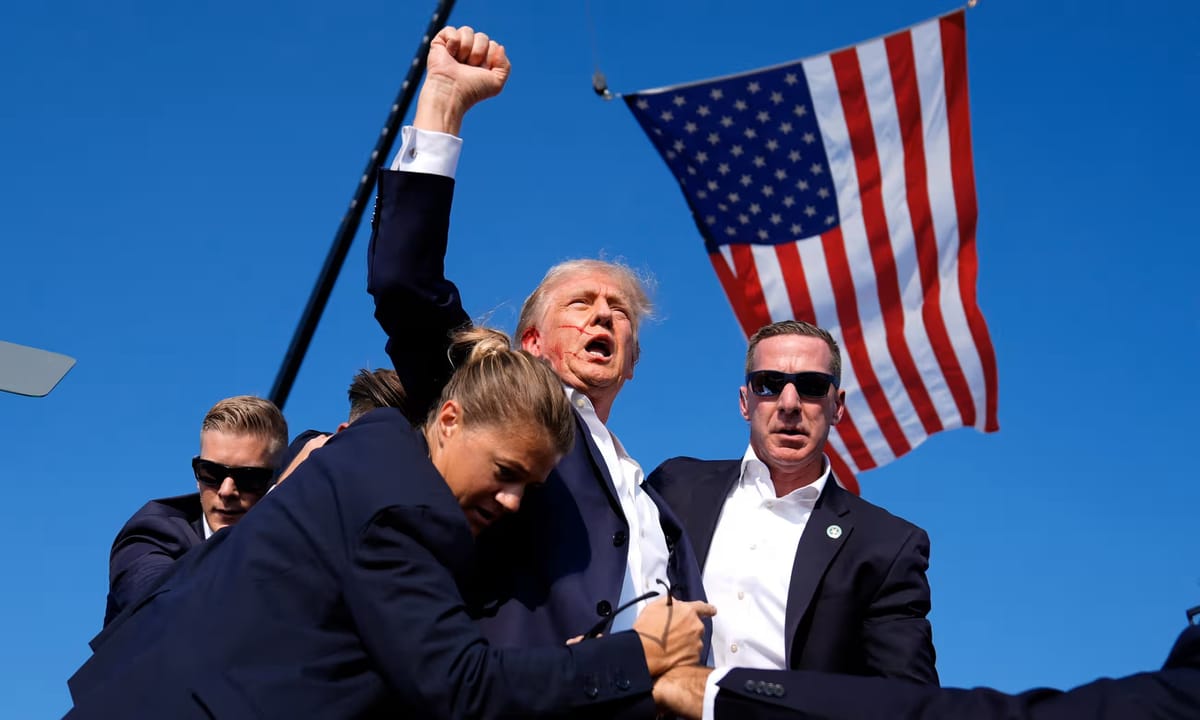Climate Culture: July 2024
On Tao Lin, Charli XCX, and that photo of Trump

In 'Climate Culture', I share what I've been reading, listening to, or watching that's had me thinking about the climate crisis.
Photograph of Donald Trump and Secret Service agents after assassination attempt, Evan Vucci, Associated Press, 13 July 2024
Everyone (including Trump) said the photo was instantly iconic. Strange, then, that writing about it two weeks later feels like rehashing a stale meme. Who knows what images will stand out to history from our age or what they'll come to represent. The emblematic photo of the Trump era could end up being this one, or it could be something dredged up from the depths of a niche sub-Reddit or a MAGA supporter's camera roll. Evan Vucci's photo certainly has the formal qualities to stand the test of time, but I suspect that's less than half the battle. Online, I saw Democrats complaining about how newspapers and magazines had run the photo so prominently. They said it was irresponsible to glorify Trump, to turn him into a martyr, to make him look so cool. Any editor who turned down this image without better reasoning than that was not doing their job properly. The blood, the flag, the fist, the faces, the sky, the uncertain angle, and the contrasts in body language — they properly depict the strange, spooky nature of this strange, spooky moment.
Leave Society by Tao Lin, Vintage Books, 2021
I've long been fascinated by the autofiction of Tao Lin. In my early 20s, I enjoyed his Taipei, though I had second thoughts when a girl I desperately wanted to impress told me she found it "shallow". Perhaps that's partly why it took me a few years to get around to reading his 2021 follow-up, Leave Society. Part of the novel's premise is that protagonist Li — who very much resembles the author Tao Lin, who very much resembles Taipei's protagonist Paul — finds the life he wrote about in his previous novel shallow and dissatisfying. He wants to heal himself and connect more deeply with family and nature. Li realises our civilisation causes damage to people and their health – and it's hard to argue with that. Many of Li's particular beliefs seem less water-tight, including his views on pre-history, history, post-history, nutrition; dentistry, radiation, and physics. But this is a novel, not a textbook or health manual. Novels make their meaning through symbolism, irony, and metaphor. Things are complicated by the 'auto' half of 'autofiction', but then again, symbolism, irony, and metaphor exist in real life too. Leave Society's narrator tells us of Li: "For a few months, he’d considered abandoning autobiography, but he liked its self-catalyzing properties too much – how it made life both life and literature, imbuing both with extra meaning." I get the sense that for Lin, through writing, life takes on some of the characteristics of fiction, just as fiction takes on some of the characteristics of life. I agree with many of the conclusions Li draws in Leave Society: patriarchy is constructed, we can learn much from Indigenous cultures, our society is out of touch with awe and mystery, and fossil fuel corporations have squashed the development of better energy technology. I also appreciate his takedown of Yuval Noah Harari's Sapiens, "an international bestseller recommended by Bill Gates and Mark Zuckerberg" which depicts "the mainstream model of history", where domination and patriarchy are portrayed as natural and just the way things are. (Now that's what I'd call a shallow book — and one I couldn't finish.)
'kamala IS brat', Charli XCX tweet, 22 July, 2024
kamala IS brat
— Charli (@charli_xcx) July 22, 2024
Here's my conspiracy theory: Charli XCX's 'kamala IS brat' tweet is crisis comms encouraged by her PR team in response to fans on Reddit, TikTok, and Twitter trying to cancel her for listening to a podcast and making a piece of art inspired by said podcast. I say this because Kamala is obviously not brat, and Charli surely knows it. I've been a big Charli fan since her first album, especially since the stylistic innovations of Number 1 Angel and Pop 2. To my taste, her work finds an absolute sweet spot between experimentation and pop thrills. I never thought I'd see the day Charli XCX came to dominate a US political news-meme cycle, in an election year no less, but here we are. Brat the album is great. Sonically, my favourite moments are the abrasive pop overload of bonus track 'Spring Breakers' (which samples my favourite Britney Spears song), the processed vocals of 'Girl, so confusing', and the fun little piano break in 'Mean girls'. I also like the straightforward, nonfigurative, slightly clunky lyrics to many of the songs, which give the work a sense of personality. I hear in Brat a diaristic style, heavy on the proper nouns, that's become popular in recent pop lyricism, following Lana del Rey and possibly Mark Kozelek before her. (Taylor Swift tried to do it too on The Tortured Poet's Department – I did enjoy the title track, but not much else.) (Has Lana written a more influential lyric than "'Crypto forever!' scrеams your stupid boyfriend/Fuck you, Kevin"?) All in all, Brat is a real good time, and is finding a large audience. I suspect the brat persona, vulnerable and insecure on the one hand, hedonistic and brash on the other, connects so well with digital natives because it reflects how using Instagram makes them feel. Brat the album is not just music for the club — it's also music for the internet, which perhaps explains in part why brat the meme has become such a cultural force — though one that seems to have morphed into its own thing entirely.
SCOOP: I have been informed that Nancy Pelosi has been informed of the meaning of Brat today.
— David Hogg 🟧 (@davidhogg111) July 23, 2024